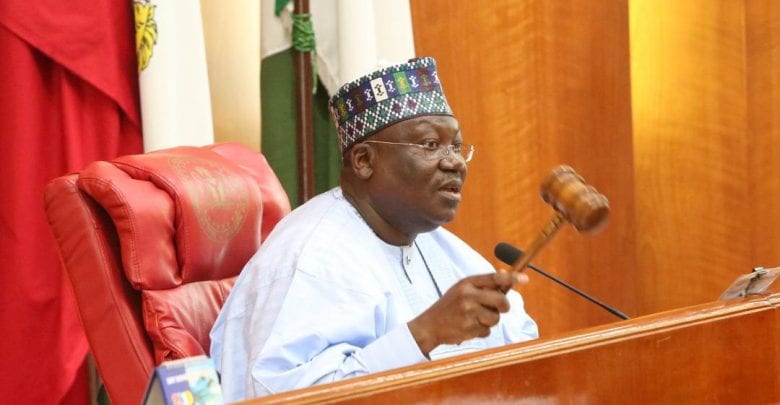
Last week at the Senate was filled with interesting events as several bills and issues were discussed at the floor of the red chambers.
While some did not gain public attention, some generated controversies and became topics of public debate.
Amongst those that was met with widespread criticism is the bill proposing the ban on importation of power generating sets.
POLITICS NIGERIA, in this round-up, reviews the top discussions at the Senate last week.
Public hearing on Anti-Social media bill
On Monday, the Senate Committee on Judiciary, Human Rights and Legal Matters held the public hearing of the bill having passed first and second reading.
The bill, ‘Protection from Internet Falsehood and Manipulations Bill, 2019,’ was introduced in the Senate in November 2019.
Many Nigerians have kicked against it and the lawmakers have come under criticism for considering the bill. Many have said the bill is targeted at silencing the media and the civic space.
The legislation comes a few years after a similar anti-social media bill introduced in the eight Senate, sparked outrage across the social media platforms.
At the public hearing, activists, civil societies and many others countered the passage of the bill.
Finance Act amendment
On Tuesday, President Muhammadu Buhari’s letter seeking amendments to the Finance Act recently passed by the National Assembly, was read on the senate floor.
The Finance Act necessitated the increment in the Value Added Tax from 5% to 7.5%.
One of the amendments sought by the president is that the new law should take effect from February 1.
Except where lawmakers expressly state in their proposal, new laws usually come into effect as they are signed by the president.
It is however not clear why the president wants the date of implementation for the new legislation to change.
Ban on generators
On Wednesday, a senator introduced a bill that seeks to ban the importation of generators in Nigeria.
The bill, titled “a bill for an Act to prohibit/ban the importation of generating sets to curb the menace of environmental (air) pollution and to facilitate the development of the power sector,” was one of the six bills read for the first time on Wednesday.
The bill prescribes, at least, ten years imprisonment for any person who knowingly sells generator sets.
The senator representing Niger South, Bima Enagi, however, request that the ban shall not include generator sets used for essential services which include:
Medical purposes (hospitals and nursing homes and healthcare facilities), airports, railway stations/services, elevators, escalators, research Institutions and facilities that require 24 hours electric power supply.
The lawmakers are expected to debate the details of the bill on another legislative day.
The introduction of the bill comes four months after the Senate rejected a resolution to temporarily ban the importation of generators.
HND minimum qualification for Presidential and Governorship candidates
A bill proposing Higher National Diploma (HND) as the minimum qualification for citizens seeking to be president or governors was introduced on Wednesday and passed second reading on Thursday.
The bill sponsored by Istifanus Gyang (PDP, Plateau) also seeks to make the Ordinary National Diploma (OND) the minimum qualification for contesting for state and federal legislative seats.
The bill was however referred to the Senate committee on constitution review for further legislative work.
The bill seeks to alter the Constitution of the Federal Republic of Nigeria to provide for the amendment of Sections 65 (2) (a), 131 (d), Section 106 (c) and Section 177 (d) on minimum educational qualification for those seeking election as state or federal lawmakers, as well as governors, president and their deputies.
In the proposed amendments, those seeking to be president, governors, senators, members of the House of Representatives and members of State Houses of Assembly, must possess new minimum educational qualifications.
Striping Vice-presidents, Governors’ immunity
A bill that seeks to strip vice-presidents, governors and deputy governors of immunity when found guilty of fraud or electoral crimes, has scaled second reading at the Senate.
The legislation however, excludes the president.
The bill, sponsored by the deputy senate president, Ovie Omo-Agege, was one of 10 constitutional amendment bills read for the second time on Thursday. The bills were referred to the Senate committee on constitution review for further legislative work.
The bill seeks to alter Section 308 of the Constitution of the Federal Republic of Nigeria which deals with immunity.
It is titled: “A Bill for an Act to alter the provisions of the Constitution of the Federal Republic of Nigeria, 1999 to qualify criminal liability for certain public officers under Section 308.”
The explanatory memorandum of the bill states: “This act provides for qualification of the immunity clause to exclude immunity for Public Officers referred to in Section 308 from criminal liability where the offence involves misappropriation of funds belonging to the Federal, State or Local Government and also the use of thugs to foment violence.”
